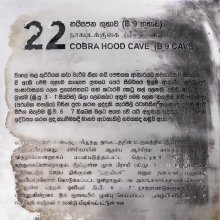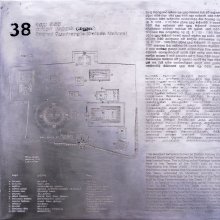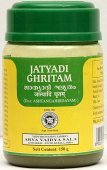Nish, Niśā, Niś, Niśa, Ṅīṣ, Nisā, Niṣ, Nishe, Nisha, Nisa: 19 definitions
Introduction:
Nish means something in Hinduism, Sanskrit, Hindi, biology. If you want to know the exact meaning, history, etymology or English translation of this term then check out the descriptions on this page. Add your comment or reference to a book if you want to contribute to this summary article.
The Sanskrit terms Niśā and Niś and Niśa and Ṅīṣ and Niṣ can be transliterated into English as Nisa or Nisha or Nis or Nish, using the IAST transliteration scheme (?).
Images (photo gallery)
In Hinduism
Vyakarana (Sanskrit grammar)
Source: Wikisource: A dictionary of Sanskrit grammarṄīṣ (ङीष्).—Fem. afix ई (ī), which is udatta, applied to words in the class of words headed by गौर (gaura), as also to noun bases ending in affixes marked with.mute ष् (ṣ), as also to words mentioned in the class headed by बहुः (bahuḥ) cf. P.IV.1.41-46.It is also added in the sense of 'wife of' to any word denoting a male person; cf. P. IV. 1. 48, and together with the augment आनुक् (ānuk) (आन् (ān)) to the words इन्द्र, वरुण (indra, varuṇa) etc e.g. इन्द्राणी, वरुणानि, यवनानि (indrāṇī, varuṇāni, yavanāni) meaning 'the script of the Yavanas' cf. P. IV. 1.49. It is also added words ending in क्रीत (krīta) and words ending in क्त (kta) and also to words expressive of ' limbs of body ' under certain conditions; cf. P.IV.1. 50-59 and IV. 1.61-65.

Vyakarana (व्याकरण, vyākaraṇa) refers to Sanskrit grammar and represents one of the six additional sciences (vedanga) to be studied along with the Vedas. Vyakarana concerns itself with the rules of Sanskrit grammar and linguistic analysis in order to establish the correct context of words and sentences.
Ayurveda (science of life)
Agriculture (Krishi) and Vrikshayurveda (study of Plant life)
Source: Shodhganga: Drumavichitrikarnam—Plant mutagenesis in ancient IndiaNiśā (निशा) refers to the “powder of Curcuma longa” and is used in various recipes for bio-organic manipulation of plants/flowers/fruits, according to the Vṛkṣāyurveda by Sūrapāla (1000 CE): an encyclopedic work dealing with the study of trees and the principles of ancient Indian agriculture.—For example, while describing a recipe for manipulating the colour of flowers or fruits (on the tree): “The white flowers of a tree turn into a golden colour if the tree is watered with a mixture of Curcuma longa powder [e.g., Niśā], Butea monosperma, Gossypium herbaceum seed, Rubia cordifolia and the Symplocos racemosa tree”.
Unclassified Ayurveda definitions
Source: archive.org: Vagbhata’s Ashtanga Hridaya Samhita (first 5 chapters)Niśi (निशि) refers to the “night”, as mentioned in verse 5.29-31 of the Aṣṭāṅgahṛdayasaṃhitā (Sūtrasthāna) by Vāgbhaṭa.—Accordingly, “[...] Of sour digestion and taste, constipating, heavy, (and) warming (are) curds [viz., dadhi]; Never shall one take them at night [viz., niśi], never warm, (and) not in spring, summer, and autumn (in any other season) not without mung-bean soup nor without honey nor without ghee and sugar nor without emblic myrobalans, also not continuously and not slightly unfinished”.

Āyurveda (आयुर्वेद, ayurveda) is a branch of Indian science dealing with medicine, herbalism, taxology, anatomy, surgery, alchemy and related topics. Traditional practice of Āyurveda in ancient India dates back to at least the first millenium BC. Literature is commonly written in Sanskrit using various poetic metres.
Jyotisha (astronomy and astrology)
Source: Wisdom Library: Brihat Samhita by VarahamihiraNiśi (निशि) refers to the “night”, according to the Bṛhatsaṃhitā (chapter 5), an encyclopedic Sanskrit work written by Varāhamihira mainly focusing on the science of ancient Indian astronomy astronomy (Jyotiṣa).—Accordingly, “[...] If, as some say, there be two Rāhus, when the moon is eclipsed by one of them at rising or setting how comes it we see the sun in the opposite point uneclipsed by the other Rāhu of equal motion? The truth is that in her own eclipse, the moon enters the shadow of the earth, and in that of the sun, the solar disc. Hence, the lunar eclipse does not commence at the western limb nor the solar at the eastern limb. Just as the shadow of a tree neither continues in the same direction nor of the same length, so changes the shadow of the earth, night after night [i.e., niśi] owing to the revolution of the sun”.

Jyotisha (ज्योतिष, jyotiṣa or jyotish) refers to ‘astronomy’ or “Vedic astrology” and represents the fifth of the six Vedangas (additional sciences to be studied along with the Vedas). Jyotisha concerns itself with the study and prediction of the movements of celestial bodies, in order to calculate the auspicious time for rituals and ceremonies.
Shaktism (Shakta philosophy)
Source: Google Books: ManthanabhairavatantramNiśi (निशि) refers to a “night”, according to the Manthānabhairavatantra, a vast sprawling work that belongs to a corpus of Tantric texts concerned with the worship of the goddess Kubjikā.—Accordingly, “Earth, Water, and Fire as well as Wind and Space—these are the five great sacred seats that give rise to Day and Night [i.e., divā-niśi]. (The seat named after) the syllable OṂ is the Earth Principle. Water is the venerable Pūrṇagiryaka. The Fire Principle is called Jāla. Wind is the venerable Kāmarūpaka. Space is said to be Tisra. The seats that have arisen from the Kula (the matrix of energies) are five. [...] Fire is above. Water is below. Slanted (to the side) above is Wind. Earth, in the middle, is the immobile Vidyā and Space is everywhere”.

Shakta (शाक्त, śākta) or Shaktism (śāktism) represents a tradition of Hinduism where the Goddess (Devi) is revered and worshipped. Shakta literature includes a range of scriptures, including various Agamas and Tantras, although its roots may be traced back to the Vedas.
Ganapatya (worship of Ganesha)
Source: archive.org: Shiva Purana - (Ganesha)Niś (निश्) refers to the “night” (suitable for the worship of Gaṇeṣa), according to the Śivapurāṇa 2.4.18 (“Gaṇeśa crowned as the chief of Gaṇas”).—Accordingly, as Śiva said to Gaṇeśa: “[...] The devotee shall keep awake at night (niś) and perform worship in the morning. After that the rites of formal dismissal with the mantra ‘kṣemāya punarāgamanāya ca’ (For welfare and return again) shall be performed. The benediction as well as good wishes shall be received from the boy. In order to make the Vrata complete, handfuls of flowers shall be offered. [...]”.
Ganapatya (गाणपत्य, gāṇapatya) represents a tradition of Hinduism where Ganesha is revered and worshipped as the prime deity (ishta-devata). Being a minor though influential movement, Ganapatya evovled, llike Shaktism and Shaivism, as a separate movement leaving behind a large body of literature.
General definition (in Hinduism)
Source: Shodhganga: Temples and cult of Sri Rama in Tamilnadu (h)Nisi or Adhayama refers to the time at “night” (at about 9 PM).—Offering of water and food or tirtham and prasadam to the deities on the different occasions or specified hours of the day is an important item in the daily pujas. [...] While for the daily routine, only ordinary plain rice was offered, special food preparations were offered often on festival days. [...] The time meant for the daily rituals in Hindu temples are performed [for example, during Nisi].
Biology (plants and animals)
Source: Google Books: CRC World Dictionary (Regional names)Nis in India is the name of a plant defined with Triticum aestivum in various botanical sources. This page contains potential references in Ayurveda, modern medicine, and other folk traditions or local practices It has the synonym Zeia vulgaris var. aestiva (L.) Lunell (among others).
Example references for further research on medicinal uses or toxicity (see latin names for full list):
· Flora Taurico-Caucasica (1808)
· Taxon (2000)
· Species Plantarum (1753)
· Journal of Phytopathology (2005)
· Histoire des Plantes de Dauphiné (1787)
· Grasses of Burma (1960)
If you are looking for specific details regarding Nis, for example pregnancy safety, health benefits, extract dosage, diet and recipes, chemical composition, side effects, have a look at these references.

This sections includes definitions from the five kingdoms of living things: Animals, Plants, Fungi, Protists and Monera. It will include both the official binomial nomenclature (scientific names usually in Latin) as well as regional spellings and variants.
Languages of India and abroad
Sanskrit dictionary
Source: DDSA: The practical Sanskrit-English dictionaryNiś (निश्).—1 P. (neśati) To lose oneself in abstract meditation, meditate upon.
--- OR ---
Niś (निश्).—f. (This word is optionally substituted for niśā in all cases after acc. dual; it has no forms for the first five inflections).
1) Night.
2) Turmeric.
--- OR ---
Niṣ (निष्).—1 Ā. (neṣate) To moisten, wet.
--- OR ---
Nis (निस्).—ind.
1) As a prefix to verbs it implies separation (away from, outside of), certainty, completeness or fulness, enjoyment, crossing over, transgressing &c.; (for examples see under (nir).
2) As a prefix to nouns, not directly derived from verbs, it forms nouns or adjectives, and has the sense of (a) 'out of', 'away from'; as in निर्वन, निष्कौशाम्बि (nirvana, niṣkauśāmbi); or (b) more usually, 'not', 'without', 'devoid of' (having a privative force); निःशेष (niḥśeṣa) 'without a remainder'; निष्फल, निर्जल (niṣphala, nirjala), &c. N. B. In compound the स् (s) of निस् (nis) is changed to र् (r) before vowels and soft consonants (see nir), to a visarga before sibilants, to श् (ś) before च् (c) and छ् (ch), and to ष् (ṣ) before क् (k) and प् (p); cf. दुस् (dus).
Source: Cologne Digital Sanskrit Dictionaries: Shabda-Sagara Sanskrit-English DictionaryṆiś (णिश्).—[ṇiśa] r. 1st cl. (neśati praṇeśati) To meditate profoundly.
--- OR ---
Ṇiṣ (णिष्).—[ṇiṣa] r. 1st cl. (u) ṇiṣu (neṣati) To sprinkle, to shed as water.
--- OR ---
Ṇis (णिस्).—[(i) ṇisi] r. 2nd cl. (niṃste praṇiṃste) To kiss: the change of ṇa after a preposition is optional in the derivatives. adā-aka-seṭ idit .
--- OR ---
Niś (निश्).—f. (-niṭ) 1. Night. 2. Turmeric. see niśā. nitarāṃ śyati tanūkaroti vyāpārān śo-ka-pṛṣo0 .
--- OR ---
Niṣ (निष्).—[(u) niṣu] r. 1st. cl. (neṣati) To sprinkle.
Source: Cologne Digital Sanskrit Dictionaries: Benfey Sanskrit-English DictionaryNiś (निश्).— i. 1, [Parasmaipada.] To meditate profoundly.
--- OR ---
Niś (निश्).—probably curtailed niśā, f. Night, [Mānavadharmaśāstra] 9, 60.
--- OR ---
Niṣ (निष्).— i. 1, [Parasmaipada.] To sprinkle. niṣaṅga niṣaṅga i. e. ni-sañj + a m. A quiver, Mahābhārata 4, 1693.
--- OR ---
Nis (निस्).—adv. (ved.), and preposition, Outward, out, forth. I. Combined and compounded with verbs and their derivatives. Ii. Compounded with nouns, and implying: 1. Out of, e. g. nirvana, Being out of a forest, Mahābhārata 5, 863. 2. Negation, No, without, e. g. niranukrośa, 1. m. No compassion = mercilessness, [Rāmāyaṇa] 4, 19, 21. 2. adj. Without mercy = merciless, 2, 34, 11 Gorr. nirjīva, 1. m. Death, [Kathāsaritsāgara, (ed. Brockhaus.)] 17, 15. 2. adj. Without life, Mahābhārata 7, 1954.
Source: Cologne Digital Sanskrit Dictionaries: Cappeller Sanskrit-English DictionaryNiś (निश्).—[feminine] night.
--- OR ---
Nis (निस्).—[preposition] out of, away from ([ablative]), mostly °— as [preposition] or neg. [prefix] (cf. 2 a) in subst. & adj.
Source: Cologne Digital Sanskrit Dictionaries: Monier-Williams Sanskrit-English Dictionary1) Niś (निश्):—[from niḥ] 1. niś for nis (q.v.) before c, ch.
2) Niṣ (निष्):—[from niḥ] a for nis (q.v.) before k, kh; p, ph.
3) Nis (निस्):—[from niḥ] a ind. out, forth, away etc. (rarely used as an independent word e.g. [Atharva-veda vi, 18, 3; vii, 115, 3; xvi, 2, 1], but mostly as a prefix to verbs and their derivatives cf. niḥ- √kṣi etc. below, or to nouns not immediately connected with verbs, in which case it has the sense, ‘out of’, ‘away from’ cf. nirvana, niṣ-kauśāmbi etc. or that of a privative or negative adverb = 3 a, ‘without’, ‘destitute of’, ‘free from’, ‘un-’ cf. nir-artha, nir-mala etc., or that of a strengthening particle ‘thoroughly’, ‘entirely’, ‘very’ cf. nih-śūnya, niṣ-kevala, nir-muṇḍa; it is liable to be changed to niḥ, nir, niś, niṣ, and nī; cf. above and below).
4) Niś (निश्):—a for nis, in [compound] See p. 542, col. 3.
5) 2. niś [class] 1. [Parasmaipada] neśati, to meditate upon, be absorbed in meditation, [Dhātupāṭha xvii, 73.]
6) 3. niś f. (occurring only in some weak cases as niśi, śas, śau, śos [and niḍbhyas, [Pāṇini 6-1, 63]], for or with niśā, and [probably] connected with nak, nakta; cf. also dyu-, mahā-) night, [Manu-smṛti; Mahābhārata; Varāha-mihira; Śakuntalā] etc.
7) niśi niśi, every night, [Manu-smṛti iv, 129.]
8) Niṣ (निष्):—1. niṣ for nis in [compound] See p. 542, col. 3.
9) 2. niṣ [class] 1. [Parasmaipada] neṣati, to moisten, sprinkle, [Dhātupāṭha xvii, 49.]
10) Nis (निस्):—b See p. 543, col. 2.
Source: Cologne Digital Sanskrit Dictionaries: Monier-Williams Sanskrit-English Dictionary1) Niśi (निशि):—[from niś] 1. niśi [locative case] of niś, in [compound]
2) [=ni-śi] 2. ni-√śi (for 1. See p.560) [Parasmaipada] -śiśāti ([Ātmanepada] p. -śiśāna), to sharpen, whet;
2) —to excite, strengthen;—prepare or present (food etc.) for strengthening, [Ṛg-veda] (cf. ni-śo).
Source: Cologne Digital Sanskrit Dictionaries: Yates Sanskrit-English Dictionary1) Ṇiś (णिश्):—neśati 1. a. To meditate profoundly, or abstractedly.
2) Ṇiṣ (णिष्):—neṣati a. To meditate closely.
3) Ṇis (णिस्):—[(la, i-ṅa) niṃste] 2. d. To kiss.
4) Niś (निश्):—(niṭ) 5. f. Night.
[Sanskrit to German]
Sanskrit, also spelled संस्कृतम् (saṃskṛtam), is an ancient language of India commonly seen as the grandmother of the Indo-European language family (even English!). Closely allied with Prakrit and Pali, Sanskrit is more exhaustive in both grammar and terms and has the most extensive collection of literature in the world, greatly surpassing its sister-languages Greek and Latin.
Hindi dictionary
Source: DDSA: A practical Hindi-English dictionaryNiśi (निशि) [Also spelled nushi]:—(nf) night; ~[kara] the moon; ~[cara] a demon, evil spirit; ~[dina] day and night; ~[vāsara] see ~[dina].
...
Kannada-English dictionary
Source: Alar: Kannada-English corpusNiśi (ನಿಶಿ):—
1) [noun] the period of darkness between sunset and sunrise or actual period of darkness after the sunset and before the sunrise; night.
2) [noun] the quality or fact of being dark; blackness.
3) [noun] a person of black complexion or a thing that is black.
--- OR ---
Niśi (ನಿಶಿ):—[adverb] along with; together with.
--- OR ---
Nisi (ನಿಸಿ):—[noun] = ನಿಸೆ [nise].
Kannada is a Dravidian language (as opposed to the Indo-European language family) mainly spoken in the southwestern region of India.
See also (Relevant definitions)
Starts with (+1302): Nihshanka, Nihshesha, Nihshreyasa, Nihshvasya, Nihsidh, Nihspanda, Nikcakrika, Nikcalanga, Nikcamara, Nikcarayitavya, Nikcat, Nikcatvarimsha, Nikcaura, Nikcayat, Nikcayena, Nikcetavya, Nikcheda, Nikcikramisha, Nikcitam, Nikcrit.
Ends with: Burnish, Dead finish, Dinanish, Dyunish, Kawanish, Kornish, Kunish, Mahanish, Manish, Munish, Nemanish, Piney varnish, Rajanish, Rianish, Ushnish, Varnish.
Full-text (+2509): Nisa, Nishanisham, Nishahva, Pratinisham, Mahanisha, Nishata, Nishabala, Nishanta, Nishachada, Ardhanisha, Nishavedin, Nishatana, Nishabhanga, Nishamriga, Nisharatna, Nishesha, Nishoshita, Nishamani, Nishavasana, Nishaita.
Relevant text
Search found 72 books and stories containing Nish, Niśā, Niś, Niśa, Ṅīṣ, Nisā, Niṣ, Nishe, Nisha, Nisa, Nise, Ṇisā, Ni-sha, Ni-śā, Ṇis, Nīsa, Ṇiṣ, Ṇiś, Nis, Ṇisa, Niṣa, Ni-sa, Niśe, Niṣā; (plurals include: Nishes, Niśās, Niśs, Niśas, Ṅīṣs, Nisās, Niṣs, Nishas, Nisas, Nises, Ṇisās, shas, śās, Ṇises, Nīsas, Ṇiṣs, Ṇiśs, Ṇisas, Niṣas, sas, Niśes, Niṣās). You can also click to the full overview containing English textual excerpts. Below are direct links for the most relevant articles:
A fragment of the Babylonian 'Dibbara' epic (by Morris Jastrow)
Garga Samhita (English) (by Danavir Goswami)
Verse 6.17.35 < [Chapter 17 - Śrī Śrī Rādhā and Kṛṣṇa Meet at Siddhāśrama and the Nature of Śrī Rādhā’s Love Is Revealed]
Verse 6.21.7 < [Chapter 21 - In the Description of the Third Fort, the Glories of Piṇḍāraka-tīrtha]
Verse 6.21.1 < [Chapter 21 - In the Description of the Third Fort, the Glories of Piṇḍāraka-tīrtha]
Jivanandana of Anandaraya Makhin (Study) (by G. D. Jayalakshmi)
Analysis of Utprekṣā-alaṅkāra < [Chapter 6 - Dramatic aspects of the Jīvanandana Nāṭaka]
Vakyapadiya of Bhartrihari (by K. A. Subramania Iyer)
Verse 3.14.411 < [Book 3 - Pada-kāṇḍa (14): Vṛtti-samuddeśa (On Ccomplex Formation)]
Verse 3.14.410 < [Book 3 - Pada-kāṇḍa (14): Vṛtti-samuddeśa (On Ccomplex Formation)]
Verse 3.14.177 < [Book 3 - Pada-kāṇḍa (14): Vṛtti-samuddeśa (On Ccomplex Formation)]
Sahitya-kaumudi by Baladeva Vidyabhushana (by Gaurapada Dāsa)
Text 10.275 < [Chapter 10 - Ornaments of Meaning]
Text 10.174 < [Chapter 10 - Ornaments of Meaning]
Text 7.135 < [Chapter 7 - Literary Faults]
The Bhikkhus Rules (by Bhikkhu Ariyesako)
Right Livelihood < [Appendix B]
Bowls And Other Requisites < [Appendix B]
Money < [Chapter 3 - Possessions And Offerings]
Related products
(+10 more products available)










